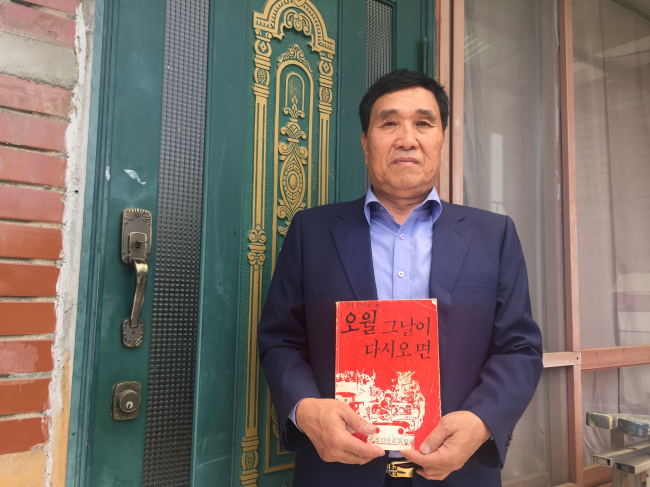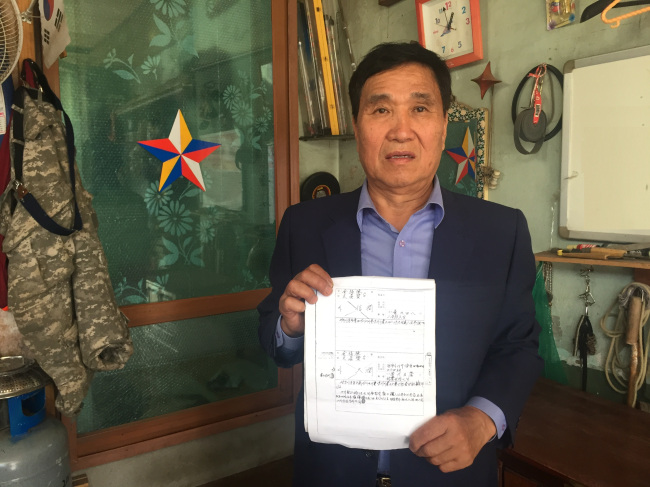GWANGJU -- For the past 38 years, Kim Dae-yoon says he has been busy. Born and raised in Gwangju, Jeolla Province, the 67-year-old has been running his own interior construction firm for almost 40 years. With his wife, he raised their two children. One of them is now married, and Kim is proud that he was able to buy his son and daughter-in-law a house. Inside his home office where he’s been residing for more than 20 years, Kim says, matter-of-factly, that he has worked hard, and it always kept him focused.
But like many Gwangju residents, May is a tough month to live through for Kim. In May, Kim often gets nightmares. Night after night, he sees faces and bodies on the ground, covered in blood. Some of them have been brutally stabbed, their intestines spilling out onto the ground. But the recurring dream is not the stuff of imagination. He saw these gruesome bodies 38 years ago, on May 18 or 19 in 1980, the first days after the Gwangju Democratization Movement -- or Gwangju Massacre -- took place in his hometown.

Kim Dae-yoon poses with a book that contains photographs of victims during the 1980 Gwangju Democratization Movement, which he purchased a few days after the 10-day deadly crackdown, in front of his home house in Gwangju, Monday. (Claire Lee/The Korea Herald)
Another face he sees in his dreams is that of one of his half brothers, Shin-yoon. The last time Kim saw Shin-yoon was in November 1978. Shin-yoon, the third child of the first wife of Kim’s father, had a mild intellectual disability. Ashamed of her son, Shin-yoon’s biological mother kicked him out of her house in Busan. Homeless, he made a living by collecting garbage in Gwangju and Busan. When he needed money or food, Shin-yoon visited Kim unannounced in Gwangju, where Kim lived with his mother and his other siblings. Shin-yoon last visited Kim in 1979 but Kim was not home at the time. The Gwangju Uprising took place a year later, in May 1980. No one has heard from Shin-yoon since.
“In my dreams, Shin-yoon appears and repeatedly begs me to save his life,” Kim told The Korea Herald.
Missing for almost 40 yearsKim is one of some 300 Gwangju residents whose family members have been registered as having gone missing during or after the Gwangju Democratization Movement. Hundreds and possibly thousands are believed to have been killed when Gwangju residents rose up against the military government led by Chun Doo-hwan on May 18, 1980. Photographs and testimonies say the Gwangju protesters were crushed, bludgeoned, stabbed and shot by martial law troops from May 18-27.
It wasn’t just the protesters who were affected by the turmoil. Kim says he saw the troops bludgeoning civilians, who were simply walking down the streets. Many civilians simply went missing. According to the Gwangju Metropolitan City Government, 242 people have been registered as missing, believed to have been affected by the deadly crackdown in 1980.
“We believe the number of those who went missing is much greater than 242,” said Park Jeong-eun, a city government official. “There may be countless people who have not been reported at all.”
In March, the government launched a task force on implementing a special law on finding the truth behind the military’s deadly crackdown in Gwangju in 1980. Since last month, as part of the implementation of the law, the Gwangju city government has been encouraging those who have missing family members to register themselves and their DNA information so that when bodies are found, they can be identified and returned to their families. So far 299 family members of the missing have undergone DNA tests. Kim also recently signed up for the test, in the hope of at least retrieving his half brother’s body.
There is no evidence that Shin-yoon was killed by the troops during the 10-day turmoil in Gwangju in 1980. But what Kim knows is that many garbage collectors in Gwangju -- called “neongma juyi” in Korean -- who were once easily spotted on streets, were suddenly nowhere to be seen after the uprising.
Kim has heard many rumors. One said the troops dragged them, along with the homeless and the disabled in Gwangju, to a concentration camp-like facility. Another said the troops simply killed all the garbage collectors, many of whom were also homeless.
“Anything is possible,” Kim said. “But all I know is that he knew Gwangju very well, and would’ve made his way to our home if he was alive. People disappeared in Gwangju -- not just the protesters, but also those who had nothing to do with the democratization movement.”
“Commie” stigma
Kim has rarely talked about Shin-yoon in the last 38 years. He was busy making a living. It was too painful to even think about what happened in May 1980. And he was worried that talking about it might stigmatize him as a “commie” or a North Korean sympathizer -- and that it might disadvantage his children.
All his life, he felt he had to prove his legitimacy as a Korean citizen to those who do not live in Gwangju, Kim said. Whenever he traveled to Seoul or Busan for work, many there would automatically accuse him of being a North Korean sympathizer as soon as Kim said he was from Gwangju. Kim said non-Gwangju residents seemed to believe what the Chun Doo-hwan regime said -- that the casualties in Gwangju were caused by “communist agitators” there, and the soldiers were only there to protect civilians.
Whenever accused of being a North Korean sympathizer, Kim would recite the code of conduct of the State Armed Forces of South Korea, which he memorized while serving his military duty in the 1970s. Once he was done reciting, he would ask them: “What kind of North Korean sympathizer would memorize such lines at all times?”
At age 67, he can still recite the phrases without having to look at the code; the phases say: “Soldiers shall respect their honor and strictly adhere to strong loyalty, true courage, a spirit knowing no retreat in battlefield, and lofty devotion to the state and people to fulfill their responsibilities at the risk of their lives.”
In 1980, the year the massacre took place in May, Kim had completed his military duty three years ago. He had a son who was just a year old at the time. Having served as an assistant instructor in the military, Kim said he knew how to use guns well. That is why he still remembers that it was M16 rifle that the martial law troops used to kill protesters and civilians. “I remember because I also used the M16 while serving the army.”
Kim said he was a well-trained soldier, but he used his military skills acquired in the army -- he said he had mastered how to hide and run well -- to escape the scene of violence during the turmoil in May. “I could’ve probably snatched a rifle from one of the troops if I really tried,” he told The Korea Herald.
“I could’ve probably saved a few lives if I indeed somehow acquired a rifle. But I didn’t. I had a baby to support at home. And I feel guilty. I’ve always felt guilty.”

Kim Dae-yoon holds a copy of the resident registration card of his missing half brother Shin-yoon. (Claire Lee/The Korea Herald)
For the past 38 years, Kim has kept a book that contains many photographs of the victims of the military massacre, as well as an old copy of his brother Shin-yoon’s resident registration. He had purchased the book secretly days after the turmoil ended. It was dangerous to keep such a book in Gwangju during Chun’s military regime.
Although he rarely spoke about the uprising and Shin-yoon, he never threw away the book and the copy of Shin-yoon’s registration document. He brought them with him whenever he moved.
“I was angry,” he said. “I bought the book because I felt like someone had to keep a book like this, in case no one ends up remembering what really happened in Gwangju. I thought someone will have to let people know by having something to show.”
The night Shin-yoon visited Kim’s house in 1978, none of Kim’s siblings wanted to share their rooms with him. Shin-yoon hadn’t showered for days, and there were lice in his hair. Kim said although he had just married his wife, he had to stay with his brother because no one else was willing to.
Kim wishes things could've been different for Shin-yoon. Regardless of his disability, Shin-yoon deserved to live at home. He deserved care and affection from his family. He wishes his own mother, who had a rather complex relationship with his half-brothers born to his father's first wife, had offered to let Shin-yoon stay at her place. He did not have to disappear the way he did. He deserved better.
“Shin-yoon nodded when I asked him if he had recently visited his mother in Busan,” he said, when asked if there is anything he remembers from the night he saw his half brother for the last time.
“He said my wife was very pretty. It became his first and last time seeing her.”
By Claire Lee (
dyc@heraldcorp.com)







